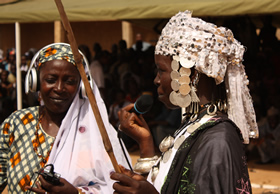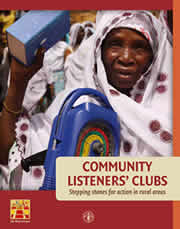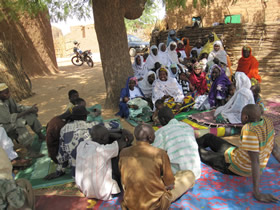FAO: Good Practice Example 1
Dimitra Project: Community Listeners' Clubs in Niger and the Democratic Republic of Congo

Since their creation in the Democratic Republic of Congo (DRC) and in Niger, the Community Listeners' Clubs have generated great interest, not only among rural communities but also development practitioners. These clubs have been extremely useful for contributing to gender equality and women's empowerment and helping rural populations, in particular women and youth, participate in the life of their community and their own development.
The community listeners' clubs have been supported since 2006 by Dimitra, an FAO project focusing on gender equality, information and communication which is also a network of farmers' organizations and rural institutions. Dimitra's objective is to give a voice to rural women and contribute to their social and economic empowerment by increasing their access to services and resources like information and communication regarding agricultural services and rural development in general.
How do the listeners' clubs work? Female, male or mixed community groups meet regularly to discuss development issues and challenges and find solutions to these together. In this process, rural radio stations are used as an information media relay to increase the communication flow, provide access to knowledge and raise awareness on themes that have been identified and requested by the clubs themselves (agricultural practices, food security, gender-based unequal work load, access to water, land, sanitation, health, etc.). The clubs' members interact within their own club or with other clubs by using solar-powered and wind-up radio sets and, in the case of Niger, solar-charger cellular phones operating as a fleet that allows free calls among nearly 300 phones.
These Community Listeners' Clubs are both a tool and a process for dialogue for individuals and groups and have proved to be an efficient means for isolated rural communities to access information and engage in participatory communication, therefore becoming stepping stones for action. Through the Clubs, men and women villagers share their concerns, priorities and needs, obtain information that would otherwise be beyond their reach and take constructive actions together.
Project Beginning and Results

The approach of the listeners' clubs was first implemented in 2006 in South Kivu (DRC) by Dimitra and its local partner, NGO Samwaki, after a field survey had underlined that women farmers' access to information and communication was very limited and that there was a gap betwesen community radio stations and rural women.
Today, after five years of activities, there are 9 federations of clubs in South Kivu, each with up to 900 members (of whom more than half are women), with a total of 8000 members. Five community radio stations are involved. In 2009, the activities were extended to the Province of Katanga (DRC) with the support of REFED-Katanga, and the approach was adapted and replicated the same year in two regions of Niger. Since their creation, the clubs in Niger have grown constantly and have generated the same enthusiasm among the populations: there are 500 listeners clubs, with 8000 members from 5000 households for a total of 28 000 people who are indirect beneficiaries, and over 5200 women leaders. Nine rural community radios are involved.
Evidence of Positive Changes
Qualitative assessments reflect changes in the behaviour, practices and perceptions of men and women in the rural communities. These include changes not only in access to information and knowledge but also in agricultural practices, in women's self-confidence and leadership, and community social mobilization. Many episodes show how women have gained self-confidence and play an active role in community life. For example, in Niger, the women listeners' club of Dantiandou has negotiated with men and traditional authorities and obtained an official land lease for 99 years to grow and sell vegetables. In the village of Téra, the women's club has been instrumental to alert the Ministry of Agriculture regarding the presence of locusts in their region while in Gasseda, the discussions of the clubs have had a positive impact on reducing the practice of early marriage. Sanitation has become a crucial issue in several villages where the related tasks are now shared within the household and at community level.

In the DRC, after years of war and continuing insecurity in several parts of the country, the debates on food security, HIV/AIDS and Gender Based Violence (GBV) have contributed to improvements in women's (and men's) livelihoods and women's position in the community. Recently, the woman President of a listeners' club in Mugogo (South Kivu, DRC) explained that thanks to the discussions in their club (that were also broadcast) the HIV/AIDS victims dare to come and ask for advice. An increase of voluntary screening for HIV/AIDS was registered just after the debates on this issue.
An improvement of women's status and leadership inside the community, both in Niger and the DRC, has often been a consequence of their active participation in the clubs and increase of their leadership and self-esteem. Through the clubs, women have the opportunity to assume an active role as fully entitled participants in community life and this has immediate benefits for their credibility in the village. The Listeners' Clubs have enabled men and women to decide on actions to solve their own problems.
Different factors show the high level of sustainability of the approach: the multiplication of successes, the replication of the experience by neighboring villages that have not received support from the project, their continuation even without support. In 2012 the experience is to be replicated in the Province Orientale of DRC and up-scaled in additional regions in Niger and in other countries such as Senegal and Burundi. Furthermore, the methodology has been taken up by other multilateral partners such as UNFPA, UNICEF and FAO's Emergency Units.
Keys to the Success of the Project
Several key elements have led to the results obtained. These include:
- The bottom-up approach used by the Dimitra project, that is based on rural populations' involvement and ownership and focuses on discussions directed towards realistic courses of action and individual behaviour changes;
- Support from Dimitra's local partners (in Niger, an NGO with a network of literacy training centers and in the DRC an NGO working with women farmers' organizations) to facilitate the whole process;
- Awareness-raising at local level (formal, traditional, religious authorities and villagers) on the approach, gender issues and their involvement in the process;
- Training provided to the stakeholders (women and men leaders, community radio stations, agricultural extension workers, etc.) to implement the approach, communicate gender for development, facilitate and mobilize communities, etc;
- Effective partnerships with radio stations and exploring alliance opportunities with other existing development actors and initiatives;
- Ensuring a long-term relationship of trust, frequent and regular contact, between the rural community and community radios.